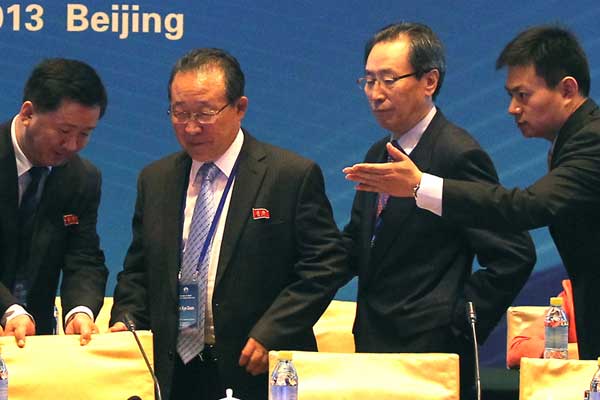Restart Six-Party Talks, says FM
Easing of tensions on peninsula presents 'a good opportunity'
Foreign Minister Wang Yi has urged all relevant parties to regard the easing of tensions on the Korean Peninsula as "a good opportunity" for restarting the stalled Six-Party Talks, emphasizing that preconditions should be "justifiable".
He made the remarks at a seminar on Wednesday in Beijing that gathered together leading scholars and officials from all countries participating in the Six-Party Talks: China, the Democratic People's Republic of Korea, the United States, Russia, Japan and the Republic of Korea.
 |
|
Wu Dawei, China's special envoy for Korean Peninsula affairs (third from left), and Kim Kye-gwan, first vice-foreign minister of the Democratic People's Republic of Korea (second from left), attend an international workshop held on Wednesday in Beijing. ZHANG WEI / CHINA DAILY |
China's top diplomat noted that the situation on the peninsula recently witnessed some positive changes, which are believed to be "hard-won fruit" achieved by the parties, along with China's contribution.
"To secure a peaceful neighborhood is China's unswerving strategic goal, and maintaining regional peace and stability is an inescapable, shared responsibility of all the relevant countries," Wang said.
Thursday marks the eighth anniversary of the signing of the Sept 19 Joint Statement, which was signed by the six parties on Sept 19, 2005. In the landmark document, the DPRK promised to abandon all nuclear weapons and existing nuclear programs.
Wang introduced four proposals for improving the situation: maintaining restraint, restarting the Six-Party Talks with constructive moves, realizing the goals set by the joint communique and addressing the justified concerns of all the parties.
Yang Xiyu, a researcher on DPRK studies at the China Institute of International Studies, said a great divergence of opinions will remain "if the six parties do not take a flexible and pragmatic attitude".
"Through frank talk, it is possible for us to push the peninsula situation forward. By using political wisdom and a diplomatic approach, we may find common ground, which is accepted by all the parties," Yang said.
The representatives in the seminar responded positively to the call for resuming the Six-Party Talks. The focus is on how to take the first step, said Qu Xing, president of CIIS, the think tank that hosted the seminar.
Kim Kye-gwan, first vice-foreign minister of the DPRK, attended the workshop, which was held on the 10th anniversary of the talks.
State Councilor Yang Jiechi met Kim in Beijing on Tuesday. Kim told Yang that the Six-Party Talks are an important platform for achieving denuclearization of the peninsula, adding that the DPRK supports China's efforts to restart the talks and is willing to maintain in-depth communication with China.
Tension seemed to further cool down after the Kaesong industrial complex, the factory park jointly operated by the DPRK and ROK in the DPRK border town of Kaesong, was reopened on Monday after bilateral reconciliation.
Pyongyang and Beijing have been more proactive than Washington and Seoul about Wednesday's workshop, analysts said, reflecting the reluctance by the US-ROK alliance toward resumption of the talks.
"Washington and Seoul have shown a willingness to resolve the peninsula nuclear issue, but at the same time they have drawn a red line — asking Pyongyang to give up nuclear weapons," said Teng Jianqun, member of the China Arms Control and Disarmament Association and a CIIS scholar.
Such policy designs — with too many preconditions — by the US and the ROK are negative and unfavorable for a resolution, Teng said.
US Secretary of State John Kerry will host his counterpart Wang Yi for a bilateral meeting on Thursday.
The Six-Party Talks began in 2003 but stalled in December 2008. The DPRK quit the talks in April 2009 in protest against international condemnation of its long-range missile tests.





















